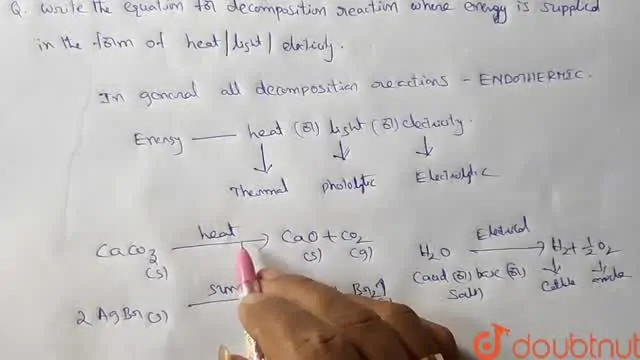Write an equation for decomposition reaction where energy is supplied in the form of heat/light/electricity. Solution in Telugu
Chemical decomposition reaction : A chemical reaction in which a single substance splits into two or more substances is called chemical decomposition.
Decomposition reaction can be takes place in varies conditions. Those are
a) On heating : If the chemical reaction takes place when heat energy is supplied it is called thermal decomposition reaction
Or
A decomposition reaction is carried out by heating is called thermal decomposition reaction.
Eg : CaCO3heat−−→CaO+CO2
b) In the presence sunlight : A decomposition reaction occurs in the presence of sunlight, is called photochemical reaction.
Eg : 2AgBrsunlight−−−−→2Ag+Br2
c) By supplying electricity : The decomposition reaction takes place in electrolysis method is called decomposition reaction by electrolysis.
Eg : Water dissociates to hydrogen and oxygen.
2H2Oelectrolysis−−−−−→2H2+O2
Related Playlists
- BOOK - VGS PUBLICATION-BRILLIANTCHAPTER - CHEMICAL REACTIONS AND EQUATIONSEXERCISE - FILL IN THE BLANKS6videos
CHEMICAL REACTIONS AND EQUATIONS
- BOOK - VGS PUBLICATION-BRILLIANTCHAPTER - CHEMICAL REACTIONS AND EQUATIONSEXERCISE - Match the following :1videos
CHEMICAL REACTIONS AND EQUATIONS
- BOOK - VGS PUBLICATION-BRILLIANTCHAPTER - ATOMS AND MOLECULESEXERCISE - OBJECTIVE TYPE QUESTION1videos
ATOMS AND MOLECULES
- BOOK - VGS PUBLICATION-BRILLIANTCHAPTER - IS MATTER PURE?EXERCISE - EXERCISE233videos
IS MATTER PURE?
Similar Questions
The decomposition of vegetable into compost is an exmaple of ……………reaction.
02:41View SolutionMatch the following :
1) 2AgNO3+Na2CrO4→Ag2CrO4+2NaNO3a) combination reaction2) 2NH3→N2+3H2b) decomposition reaction3) C2H4+H2O→C2H6Oc) displacement rection4) Fe2O3+3CO→2Fe+3CO2d) double displacement rection02:10View SolutionWashing soda'is the common name of
03:02View SolutionWhich separation techniques will you apply for the separation of the following ?
(a) Sodium chloride from its solution in water.
(b) Ammonium chloride from a mixture containing sodium chloride and ammonium chloride.
( c) Small pieces of metal in the engine oil of a car.
(d) Different pigments from an extract of flower petals.
(e) Butter from cards (f) Oil from water
(g) Tea leaves from tea. (h) Iron pins from sand
(i) Wheat grains from husk.
(j) Find mud particles suspended in water.03:02View SolutionWrite one equation each for decomposition reactions where energy is supplied in the form of heat, light or electricity.
02:00View SolutionDecomposition reactions require energy either in the form of the heat or light or electricity for breaking down the reactants. Write one equations each for decomposition reactions where energy is supplied in the form of heat, light and electricity .
02:41View SolutionWrite one equation for decomposition reactions where energy is supplied in the form of heat, light or electricity.
03:02View SolutionWrite one equation for decomposition reactions where energy is supplied in the form of heat, light or electricity.
02:04View SolutionWrite one equation each for decomposition reactions where energy is supplied in the form of heat, light or electricity.
View SolutionWrite one equation each for decomposition reactions where energy is supplied in the form of heat, light or electricity.
View SolutionWrite one equation for decomposition reactions where energy is supplied in the form of heat, light or electricity.
02:52View SolutionDecomposition reaction requires energy in the form of heat or light or electricity for breaking the reactants. Write one example for each with equation.
01:59View SolutionWrite one equation each for decomposition reactions where energy is supplied in the form of heat, light or electricity.
View SolutionDecomposition reactions require energy either in the form of heat or light or electricity for breaking down the reactants. Write one equation each for decomposition reactions where energy is supplied in the form heat, light and electricity.
02:58View SolutionWrite one equation each for decomposition reactions where energy is supplied in the form of heat, light or electricity.
View Solution


